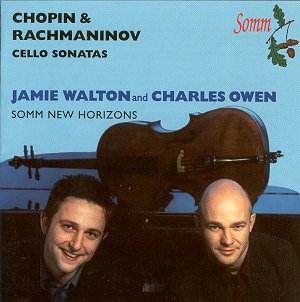What these two sonatas have in common, of course, is
that the composer of each was also a great and renowned pianist. In
the case of Chopin, the vast majority of his compositions were for his
own instrument, whereas Rachmaninov, with three symphonies to his credit,
for example, was far more wide-ranging in respect of the forms in which
he chose to work.
Chopinís sonata was composed towards the end of his
tragically short life for the French cellist Auguste Franchomme, and
is one of three works by Chopin for this combination of instruments.
Itís a most beautiful piece, well worth investigating if you know the
composer only for his piano music. As might be expected, the piano part
is very involved, but the cello writing is strikingly individual, and
the whole piece, unsurprisingly given its composer, is extremely melodic.
The short slow movement is particularly touching.
At half an hour in length, this is a big piece, but
Rachmaninovís sonata is conceived on an even greater scale. Dating from
1901, it is roughly contemporary with his Second Symphony and even if
it is less expansive than that piece Ė it would be exhausting if it
werenít Ė it shares pretty much the same mood and sound-world. It begins
with a slow introduction full of characteristic Rachmaninov brooding
Ė Stravinsky called him "a six foot scowl" Ė and displays
a full quota of those ardent, yearning melodies so typical of the composer
and so well-suited to the cello. Like the Chopin sonata, it is full
of its composerís fingerprints, and anyone already familiar with Rachmaninovís
music from other, more widely known works, will recognise him immediately
here.
Jamie Walton is a young cellist who studied at Wells
Cathedral School and later at the Royal Northern College of Music in
the United Kingdom. Let me say at once that his playing here is absolutely
outstanding. Technical brilliance is allied to a wonderful singing tone,
and the sheer generosity of his playing is quite striking. When the
music demands it, notably in some passages in the Chopin, he scales
down the sound with similar skill, and indeed he possesses a prodigious
range of tone colour. Amateur pianists should beware of their cellist
friends inviting them round for "a bit of chamber music".
Indeed, if it includes either of these sonatas they would probably be
better advised to steer clear. The word accompaniment is totally unsuited
to the piano parts here: the piano writing in both works, but especially
in the Rachmaninov, closely resembles that of the composerís piano concertos,
and a comparable technical expertise is required to play them. Charles
Owen rises magnificently to the task, and the result is a true collaboration
between two musicians, at once moving and exhilarating. Both instruments
are well recorded and given an ideal balance, the piano not at all backward
in the sound picture.
The cello seems in the past to have attracted musicians
with outsize personalities, and any young player has in some way to
find his own place in this assembly. Rostropovich is incomparable, of
course, and his version of the Chopin sonata merits the same adjective.
There are several rival versions of the Rachmaninov sonata available,
a particularly interesting reading being that of Michael Grebanier on
Naxos. But the compelling nature of the playing here, and the total
commitment of the two musicians make for an unforgettable experience.
Another winner, then, in Sommís new series promoting
the younger generation of musicians, altogether unmissable for anyone
wanting these two particular works.
William Hedley


